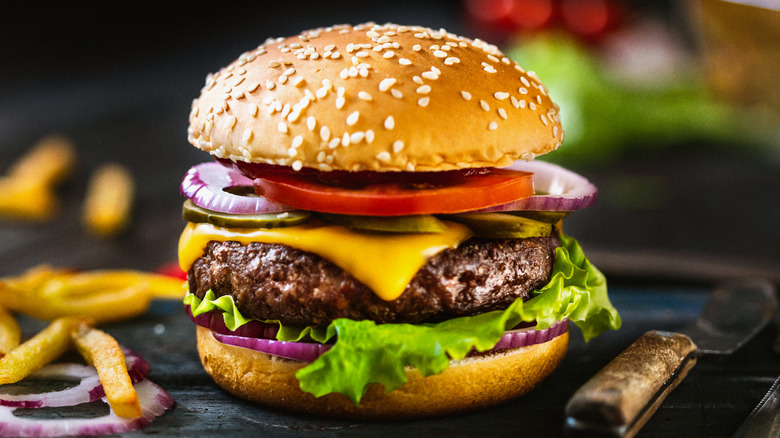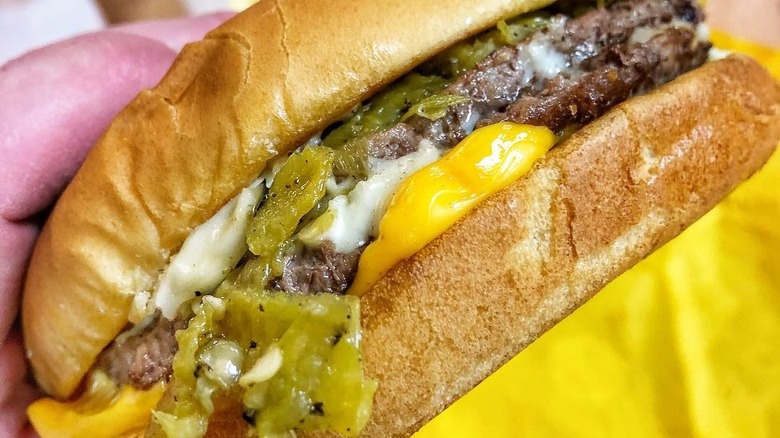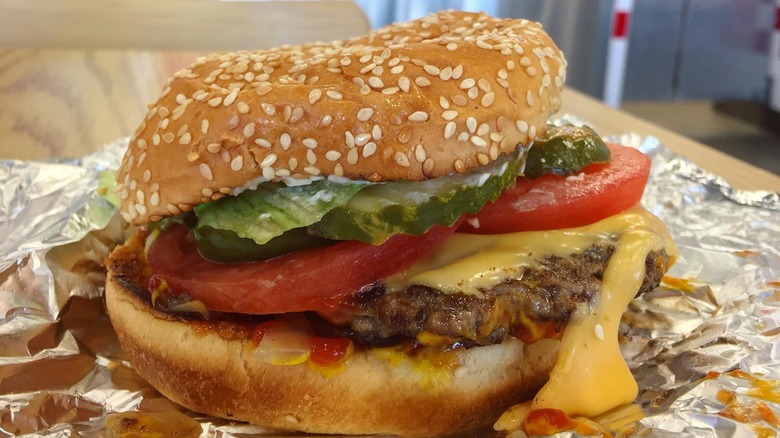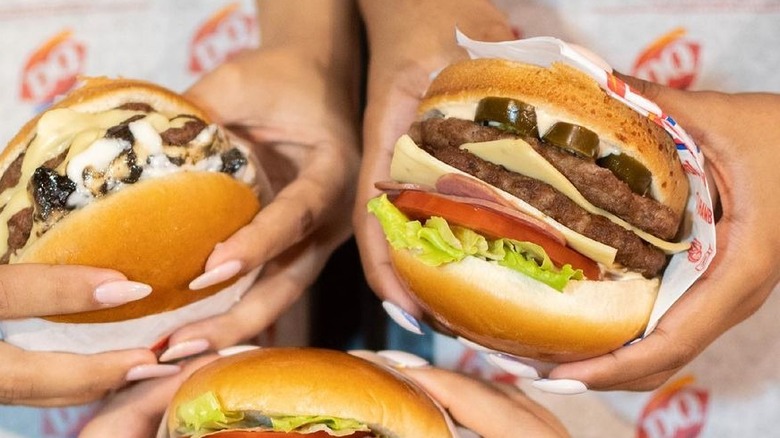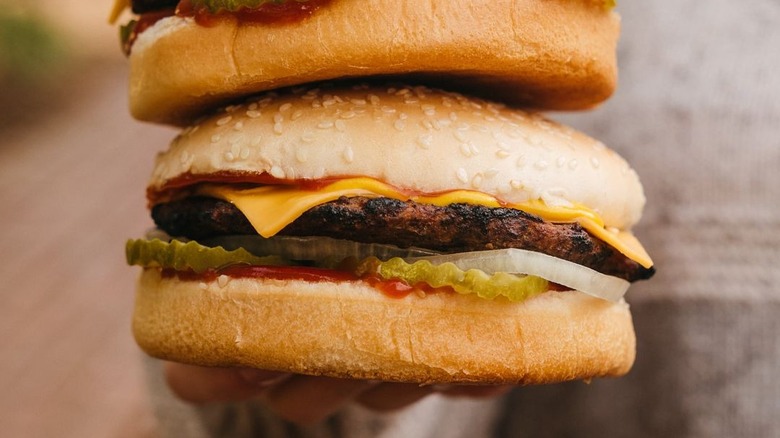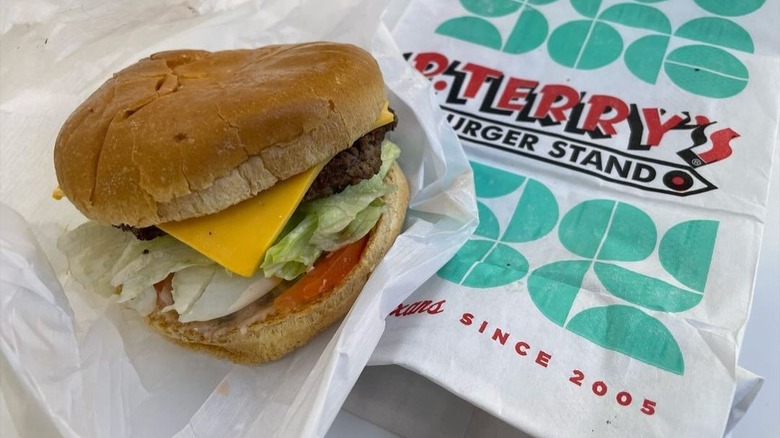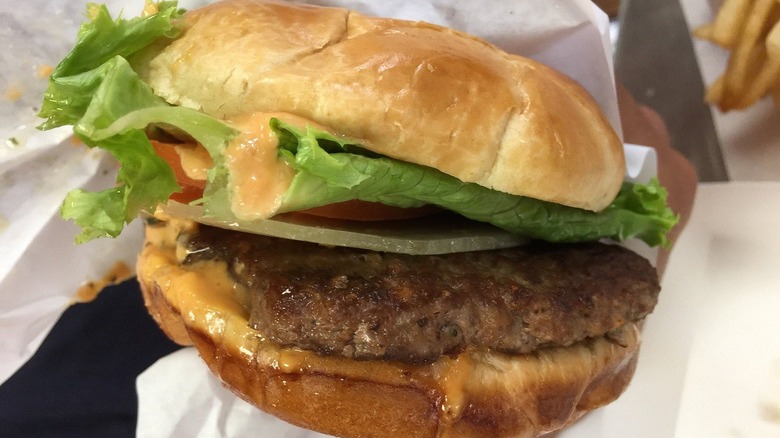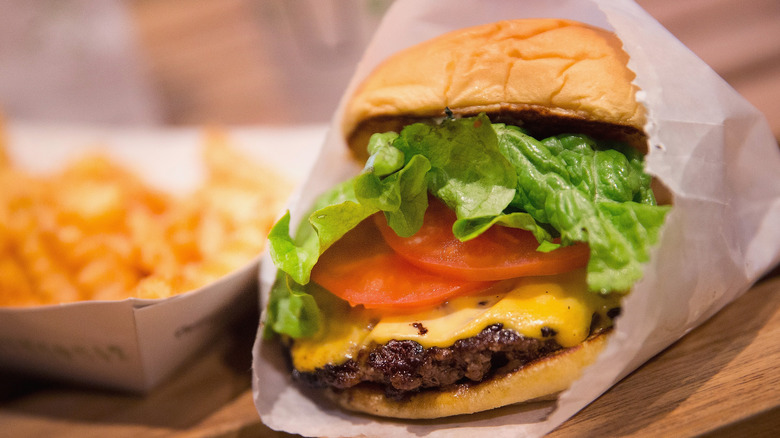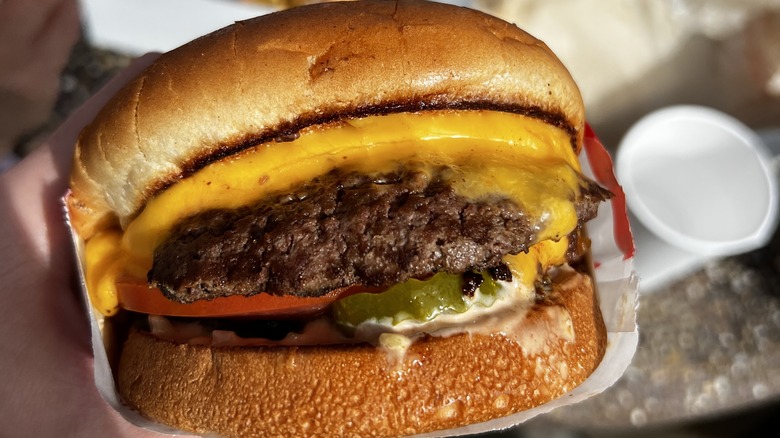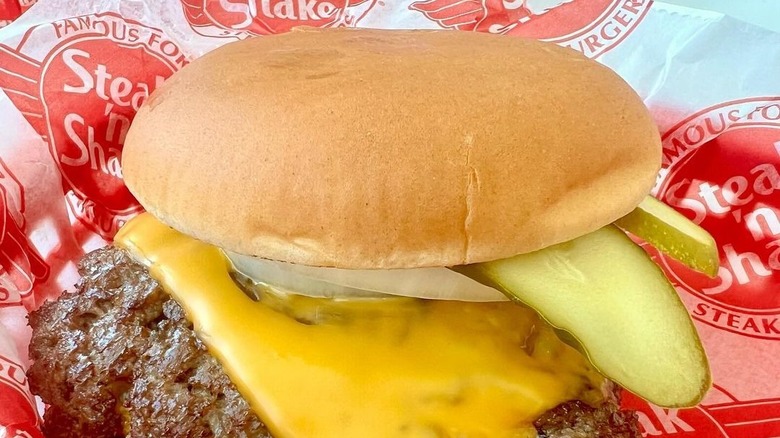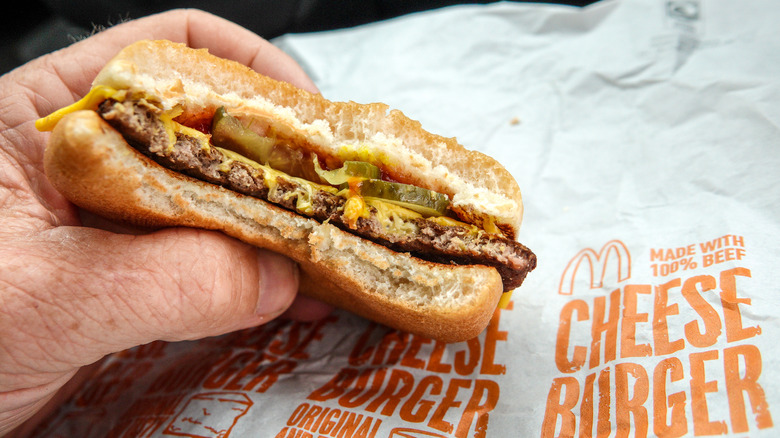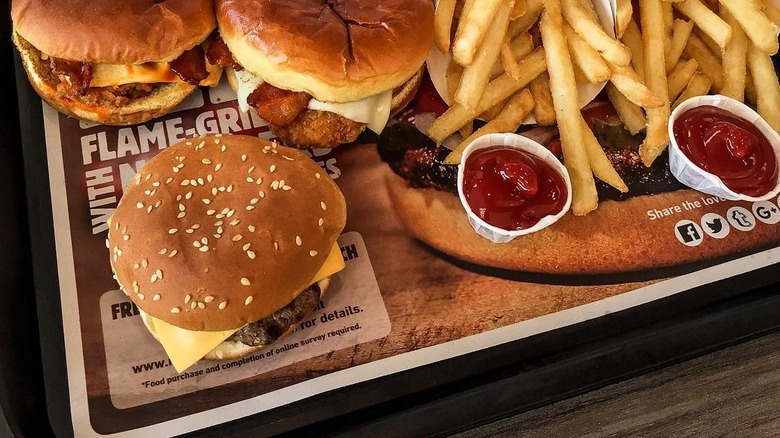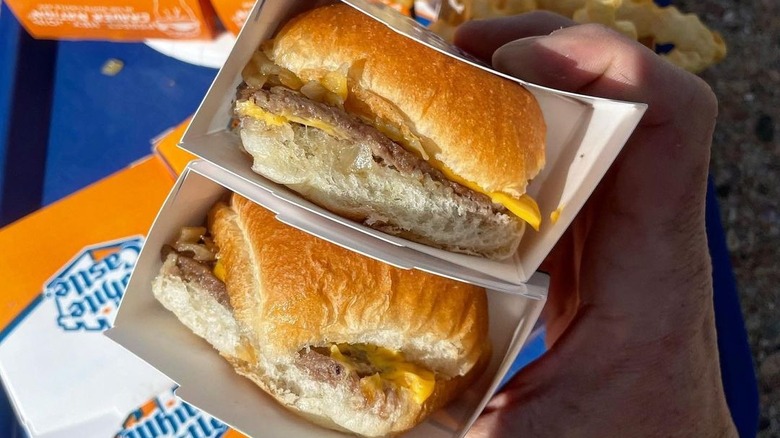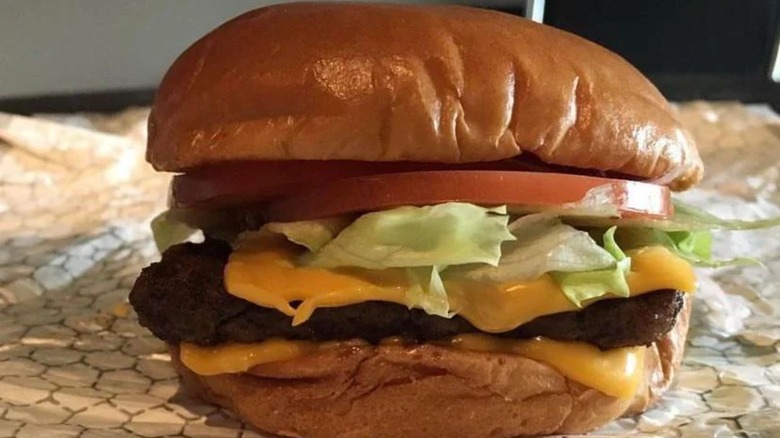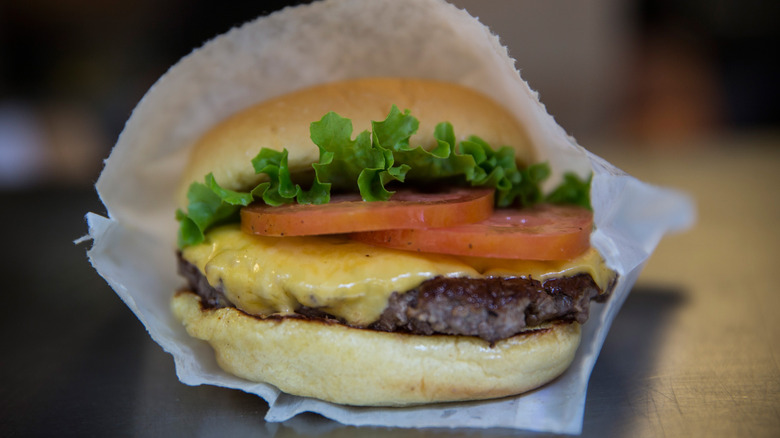14 Popular Fast Food Cheeseburgers Compared By Nutrition
When you order a cheeseburger, the odds are you aren't thinking about its nutritional benefits. For most people, the number one concern when a fast food worker passes you a paper bag filled with stacks of meat, cheese, and bread is that the next few minutes reach the same level of delicious, filling bliss that's earned cheeseburgers the title of America's go-to comfort food.
Besides, chowing down on a cheeseburger isn't totally without its strengths. A hefty dose of protein and iron are two of its saving graces. However, the downside is usually that this protein is packaged with not-so-nutritional toppings. It's the hidden extra fat and calories that drag burgers down in the eyes of experts. The patties themselves also tend to be highly salted (some contain more than a quarter of your daily recommended sodium intake), while the bread is packed with preservatives or added sugars.
But it's not all bad news. Some burgers are built differently than others. As a rule, if it looks like one of the mind-blowing food challenges on "Man v. Food," it probably isn't the most nutritional choice. We studied the nutrition guides of various fast food restaurants, considering the calories and content of each burger to help you find some of the best options on the market. We'll explain how we made our choices later, but for now, here are the burgers boasting the most dietary perks.
Whataburger with cheese
When Whataburger opened its first restaurants in Texas back in the 1950s, it was renowned for selling bigger, juicier burgers than all of its rivals. While it faces much stiffer competition today, its patties are still pretty impressive and its eponymous burger remains one of the most popular items on the menu.
According to a survey by Gambling.com (via Fox 2), there are perks to ordering a cheeseburger next time you drop by Whataburger. After looking at the cheeseburgers retailed by various fast food outlets and analyzing each burger's caloric, fat, sugar, and salt content, it concluded that the Whataburger with cheese was the strongest option when you weigh up its dietary values. Each order provides 650 calories, 30 grams of fat, and 31 grams of protein.
Some nutritionists aren't entirely on board with this. Dr. Mike Sevilla, M.D. told Mashed, that the burger's 1500+ milligrams of sodium means that it "definitely would not be considered a healthy choice." In the grand scheme of fast food burgers, there are stronger caloric choices — however, it does pack a pretty impressive protein punch.
Five Guys Little Cheeseburger
Let's be clear: we're talking about the Little Cheeseburger, not Five Guys' regular Cheeseburger. As delicious and indulgent as the latter may be, its nutritional info is packed with big numbers. Each burger contains 980 calories and 55 grams of fat (for context, it's recommended that we consume somewhere between 44 and 78 grams of fat a day)
Fortunately, the Five Guys menu boasts a lighter option. Its Little Cheeseburger — which primarily cuts its calorie count by including just one meat patty — contains 610 calories, 39 grams of fat, and 27 grams of protein. It also contains nearly half the amount of sodium, with 690 milligrams versus the larger burger's 1050 milligrams.
Opting for the Little Cheeseburger doesn't mean you need to go away feeling less satisfied. One of the things that makes Five Guys so tasty is its generous selection of toppings. When you order your burger, you have free reign to add all the fiber-rich lettuce, pickles, jalapeños, tomatoes, grilled onions, green peppers, and mushrooms you want. Best of all, these are all complimentary, meaning you can go as big as you want without compromising your wallet or the nutritional value of your burger.
Dairy Queen Original Cheeseburger Signature Stackburger
Dairy Queen created a thing of magic with its Original Cheeseburger Signature Stackburger. Even though it contains two beef patties, it still ranks as a better caloric choice than some fast food cheeseburgers with just one patty.
Atop these patties, you'll find melted American cheese, pickles, ketchup, and mustard. Together, this tasty combo provides 570 calories, 31 grams of fat, and 38 grams of protein — the most protein of any burger on this list. Thanks to its sheer size, it's undeniably filling and will keep you satiated well into the afternoon, making it a solid choice when you feel like you're running on fumes.
However, it's worth noting that this second patty sends its salt levels soaring; there are 1560 milligrams of sodium in one Signature Stackburger, so you probably won't want to make this a regular meal. Fast food fanatics also have differing opinions on the quality of Dairy Queen's beef. While some consider the patties underrated, others claim that they're too chewy and comparable to cafeteria food.
Hardee's Big Cheeseburger
This is one of the most straightforward of all the burgers on the Hardee's menu. A Hardee's Big Cheeseburger will give you a quarter-pound Black Angus beef patty, slathered in American cheese, dill pickles, ketchup, and mustard, all sandwiched between a toasted potato bun.
The result is just as indulgent as it sounds. Protein-wise, it's also pretty efficient; each burger gives you 540 calories, 24 grams of fat, and 28 grams of protein. Considering the burger's size, it doesn't feel like many of these calories sneak in via the sauces or toppings. As reviewers have noted, the Hardee's Big Cheeseburger is true to its name and provides a hearty meal. "The burger was also such the perfect size," said one fan on Reddit while raving about the quality of the Hardee's beef compared to other chains. "Am I 6 years old McDonald's? Do I have the small hands and head of a child Five Guys, Shake Shack? Where do you get off? The Hardee's burger is an adult's burger."
P. Terry's Burger Stand Cheeseburger
The P. Terry's Burger Stand Cheeseburger is wonderfully uncomplicated. As well as a patty made with 100% all-natural Black Angus beef, each freshly baked bun contains classic American cheese, fresh lettuce and tomatoes, and a special homemade sauce. If that sounds a little bare to you, you can also request onions and pickles; the only reason why they're not included by default is because the chain's co-founder, Kathy Terry, doesn't like them in burgers.
Each Cheeseburger at P. Terry's Burger Stand — which has just over 30 outlets across its native Texas — contains 464 calories, 25.5 grams of fat, and 26 grams of protein. Quality has always been the number one concern for this chain. The restaurant goes out of its way to source beef that's hormone-free, antibiotic-free, and vegetarian-fed, so you also won't need to worry about any hidden additives. Don't tell the West Coasters, but some have gone so far as to brand it as a better version of In-N-Out.
Jack in the Box Jr. Jumbo Jack's Cheeseburger
There's no shortage of cheeseburgers on the Jack in the Box menu — at the time of writing, you can take your pick of six. If you're looking for something lighter, your go-to should be the Jr. Jumbo Jack Cheeseburger.
This differs from the supersized Jumbo Jack by having just one beef patty. Otherwise, its ingredients are the same: American cheese with tomatoes, pickles, lettuce, chopped onions, ketchup, and mayonnaise. The burger comes with all of these by default, but you're free to customize it as you see fit — whether that's adding more of your favorite toppings, or taking some away. If you order the burger as advertised on the menu, it will contain 440 calories, 29 grams of fat, and 16 grams of protein. If you want to cut down the amount of fat, you can also ask to remove the mayo (which, in our experience, barely makes a difference to the overall taste).
Shake Shack Cheeseburger
Shake Shack has come a long way since its birth as a hot dog cart in New York's Madison Square. Today, it's an international chain with a reputation not for wieners but for fresh, juicy burgers that the Center For Food Safety once hailed as some of the healthiest around.
When it comes to the humble Shake Shack Cheeseburger, you'll get the same freshly ground, 100% Angus, hormone-free, and antibiotic-free beef found in all of its hamburgers. Combined with American cheese and your pick of sliced tomatoes, lettuce, and pickles, this adds up to 440 calories, 24 grams of fat, and 29 grams of protein. Again, sodium levels are a little high — each burger has 1,200 milligrams — but nowhere near as high as some other items on the menu. You also have the option to swap out the potato bun for a lettuce wrap, which will shave 180 calories, 6 grams of fat, and 170 milligrams of sodium off your burger.
In-N-Out Cheeseburger
In-N-Out isn't just a restaurant chain. For many, it's a borderline religious experience — a cult classic that's survived the decades and challenges the Hollywood Walk of Fame, Golden Gate Bridge, or Disneyland as a West Coast tourist destination.
It may not be as flashy as Animal Style or as over-the-top indulgent as a 4x4 burger (which, for the uninitiated, is four beef patties layered with four slices of American cheese), but the In-N-Out Cheeseburger is the definition of a solid, high-quality burger, and is considerably lighter than many sold elsewhere. If you ditch the In-N-Out spread and stick to ketchup, mustard, and your choice of lettuce, tomato, and onions, your order will contain just 400 calories, 18 grams of fat, and 22 grams of protein. Ordering with the spread — which some argue isn't necessary for the Cheeseburger anyway — will add an extra 80 calories and 9 grams of fat to your burger.
Steak 'n Shake Single Steakburger with Cheese
Once upon a time, Steak 'n Shake ground its meat in the front of the store. Today, it sticks to just cooking them in plain view of its patrons, but it still has strict rules when it comes to the freshness and quality of its beef. Its Single Steakburger with Cheese — like all Steak 'n Shake burgers — is prepared using the "smash technique," where the meat is pushed into the griddle to make it extra thin and crispy. Cheese is added only once the meat is off the grill; the heat of the burger alone is enough to melt it. The usual toppings of lettuce, tomatoes, pickles, and onions can then also be added if you so choose.
All in all, a Steak 'n Shake Single Steakburger with Cheese has 390 calories, 20 grams of fat, and 19 grams of protein. While you can opt for a double cheeseburger (which inflates these numbers), you'll be pleased to hear that patrons agree the Single Steakburger alone nails the perfect ratio of meat, cheese, and bread. "The single with cheese at Steak 'n Shake succinctly encapsulated everything that I love about hamburgers in terms of texture and flavor," wrote food blogger Nick Solares. "To me, it is the quintessential example of the American cheeseburger."
Checkers All American Cheeseburger
Checkers — also known as Rally's in some locations — can be found in 28 states, but never seems to get enough credit for being both tasty and affordable (an increasingly rare combo in the fast food industry). Its Cheeseburger also happens to be one of the lightest out there, coming in at 330 calories (tied with the Mushroom Swissburger for the least on the entire burger menu), 18 grams of fat, and 13 grams of protein.
The aptly named All-American Cheeseburger comes with all the staples: cheese, pickles, ketchup, mustard, and a fluffy sesame seed bun. Patrons describe the beef as being fresh, and decently sized, with some taking to Reddit to push for the restaurant to be as widely-recognized as its rivals. "Their prices are severely reasonable as well," said one fan in r/UnpopularOpinions. "It outranks their burger-wielding competitors such as Wendy's, Burger King, McDonald's, etc."
McDonald's Cheeseburger
For many, this is the quintessential cheeseburger, and they wouldn't be wrong. Simple without being bland, filling without being heavy, the McDonald's Cheeseburger is a decades-old, tried-and-trusted balance of subtly seasoned, 100% pure beef, pickle, ketchup, mustard, melted cheese, and finely-chopped onions in a sesame bun. It's the latter that serves as the VIP, providing the burger with the signature sweet crunch you'll struggle to find at other fast food chains.
While it doesn't provide quite as much freedom as some of the other restaurants on this list, McDonald's does let you customize its Cheeseburger to your liking. Most of the time, this just means adding in more pickles, with which McDonald's is notoriously stingy. If you leave the burger as is, you'll get a serving with 300 calories, 13 grams of fat, and 15 grams of protein. Notably, it also contains just 720 milligrams of sodium (for comparison, a Big Mac has over 1,000 milligrams).
Burger King Cheeseburger
Burger King's famous Whoppers aren't exactly known for their nutritional benefits, but the Burger King Cheeseburger is surprisingly modest. Previously highlighted by Healthline as one of the chain's healthiest menu items, it has a relatively balanced nutritional profile that contains just 290 calories, 13 grams of fat, 15.1 grams of protein, and 560 milligrams of sodium.
There are no major surprises in its ingredients list. Like the majority of basic cheeseburgers, the lineup consists of melted American cheese, crinkle-cut pickles, mustard, and ketchup. You can also add tomatoes, white onions, and iceberg lettuce if you're so inclined (because it's Burger King, so of course you can "have it your way"). What takes it to the next level is the trademark flame-grilled finish of the beef. If you close your eyes, you could almost be eating a burger fresh from your family's barbecue grill.
White Castle Cheese Slider
First thing first: this is the smallest cheeseburger on this list, so was most likely always going to boast less fat or calories than its competitors. Portion control is a smart tactic if you're looking to eat fast food more sustainably, and White Castle does most of the job for you with its sliders.
Each White Castle Cheese Slider comes in at a sensible 170 calories, 9 grams of fat, and 8 grams of protein. The amount of sodium is also pretty low at 510 milligrams. Considering their size, they're pretty filling (although nowhere near as much as a burger from the likes of Five Guys or Shake Shack). They do, however, do a solid job at satiating the cheeseburger cravings without taking in too much saturated fat or salt.
Most importantly, they taste good. Really good. White Castle is often dubbed the world's first fast food hamburger chain, so it should come as no surprise that it knows exactly what it's doing in the kitchen. Each Cheese Slider is made with a 100% beef patty and fluffy bread bun, combined with onions and your choice of American, jalapeño, or smoked cheddar cheese. As one fan so eloquently summarized on Reddit: "Ladies and gentlemen, THIS is what a slider is."
Wendy's Jr. Cheeseburger
As the name suggests, the Wendy's Jr. Cheeseburger is the same as the chain's standard cheeseburger, just smaller. Instead of two patties, you'll find one beef patty nestled between cheese, pickles, sweet onion, ketchup, and mustard on a toasted bun.
It's everything you need a cheeseburger to be — and it won't make a heavy dent in your caloric intake. A Wendy's Jr. Cheeseburger contains 290 calories, 14 grams of fat, and 14 grams of protein. Like all Wendy's burgers, the meat is 100% fresh, never frozen, and tastes equally juicy despite the burger's small size. What's more, it has a sodium count of 610 milligrams per burger, which sits comfortably on the lower end of similar fast food items.
There's also a slightly more calorie-dense version in the shape of the Wendy's Jr. Cheeseburger Deluxe. This is essentially just a fancier version of the same standard burger, adding in tomato, lettuce, and mayo for an extra 50 calories, six grams of fat, and one more gram of protein.
Methodology
Calories play a huge part in health, but they're not everything. Every restaurant on this list provides the full nutritional breakdowns of their menu items online. To find the most nutritional cheeseburgers on the menus of fast food chains across the U.S., we looked not just at the calorie count but the amount of fat (especially saturated fat), sodium, and protein in each item, as well as the portion size. We also asked questions, such as whether each burger came with a decent serving of fiber and vitamins — in other words, is it just bread, meat, and cheese, or does it also squeeze in a good portion of veggies?
